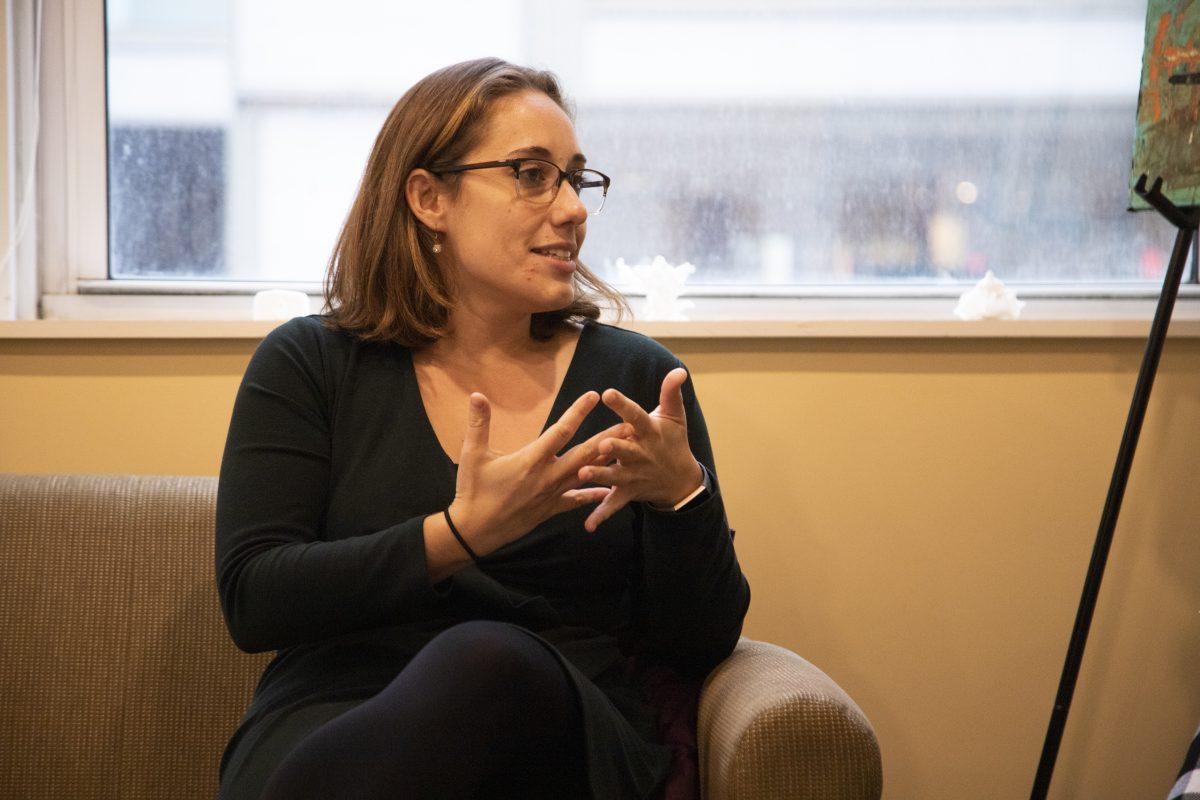Students are more likely to develop an eating disorder in college because of the stressors and pressures that appear in college, according to Gregg Nicholls, Ph.D., director of Counseling and Psychological Service (CAPS).
A survey done by The National Comorbidity Survey Replication (NCS-R) in 2007 reported that the median age of onset for binge eating disorder was 21 years old and 18 years old for both bulimia nervosa and anorexia nervosa.
“Most eating disorders begin between the ages of 18-21,” Nicholls wrote in an email to The Hawk. “Environmental factors play a significant role. With so many students living together, comparing self to others is magnified. Plus students are leading very independent lives for the first time and irregular eating habits can more easily develop.”
Alex Skolnick, Ph.D., assistant professor of psychology, teaches classes about eating disorders and says college can be a more difficult time because parents are not present to push for healthy eating.
“College can be a difficult place because you’re no longer under the hospices of your parents and there’s really no one looking out for you except some friends and they notice, ‘Hey you’re getting really thin,’” Skolnick said. “But that might not always happen.”
Addy Volpe ’20 is one of 30 million people in the U.S. who suffer from an eating disorder.
“When I was going through that it wasn’t like I was purposefully not eating,” Volpe said. “It was ‘I’m not hungry so I’m not going to do it,’ and then I started having health problems.”
For Volpe, college made it more difficult for her to manage her eating disorder because of body perceptions and all the things she has to do in her day.
“With the stress level in college, I can get away with not eating all day because I’m running around,” Volpe said. “I’m alone. My parents aren’t with me 24/7 to support me. I have to rely on my friends. It’s definitely worse in college.”
Students who are suffering from body image or eating issues can be treated at CAPS. But those diagnosed with eating disorders are usually sent to outside treatment centers, according to Nicholls.
“Specialized and more intensive treatment is needed for students with diagnosed eating disorders,” Nicholls wrote. “We refer students to clinics and centers outside of Saint Joseph’s University if that’s the case. The Renfrew Center is a treatment facility in the area that we often refer students to. Students are evaluated and different levels of treatment are recommended (inpatient, Intensive outpatient, therapy groups, etc).”
The Renfrew Center, a treatment center for women and adolescent girls who have eating disorders, opened a new facility in Center City in July because there was a request by colleges in Philadelphia for a location closer to their students.
“Given a full course load and sometimes student athletics the option of going over the bridge to our Mount Laurel site in southern New Jersey or getting on the R5 [Paoli/Thorndale regional rail] to go out to our Radnor site, the timing wasn’t working well,” said Kristin Szostak, the site director of the Renfrew Center of Philadelphia.
Szostak said the Renfrew Center does see a trend of college students coming to the center even though they treat women from ages 14-60.
“There is less structure in college transitioning from high school so it does require a lot of self imposed structure and discipline academically which is a significant change,” Szostak said. “That is often a factor that may lead to disordered eating which can then become an eating disorder.”
Casey Swann, a current medical student at Thomas Jefferson University, went through the Intensive Outpatient Program (IOP) at the Renfrew Center in 2011 and decided to seek help at Renfrew after she returned back from studying abroad in Italy and started to “spiral.”
“It was scary but the community that you meet when you’re at Renfrew is incredible,” Swann said. “Eating disorders are very isolating and it’s hard to express what you’re going through to other people who have never been through it because they’re disordered patterns of thinking. It’s not logical.”
Volpe agrees it’s hard to find people that understand what she is going through, and though she did not prefer the professional help route, she does like being able to talk to people who do understand.
“I’ve been through professional help and personally it makes me more anxious than talking to one of my peers,” Volpe said. “I like the fact that there are treatment centers and things available to people that need them and want them. It’s in the back of my brain that I do have these resources.”
Swann went to treatment with the motivation that she wanted to go into her senior year at The College of William and Mary and graduate, which she did after going through IOP, a six week program, in five weeks.
Volpe is currently in her senior year studying criminal justice. She knows her eating disorder won’t go away completely, but she is grateful that she has friends looking out for her.
“It’s never going to be suppressed just like depression or anxiety,” Volpe said. “Anyone can do any route of medications or support groups that they want. I’m living with it for the rest of my life.”
















































